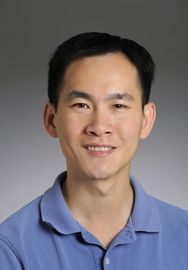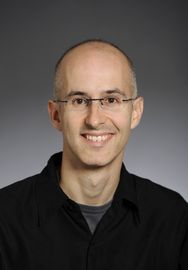Announcing the McWilliams/PSC Seed Grant 2020 Recipients
The McWilliams Center for Cosmology has partnered with the Pittsburgh Supercomputing Center (PSC) to determine the recipients of a new seed grant program to support faculty, postdoctoral fellows, and research staff who want to explore a new area of research or jumpstart their research activity. The program is designed to encourage genuine collaborations between faculty and postdocs affiliated with the Center for Cosmology and the PSC that involve either new avenues of research or the feasibility testing of new methods.
The one-year seed grants will provide $10,000-$60,000 in support for researchers to conduct preliminary analyses, demonstrate proof of concept, collect preliminary data, and establish the potential for high impact of the proposed idea for future proposal submissions.
The 2020 Seed Grant Recipients
Chad Schafer
Enabling Advances for AGN Classifcation for LSST
Image credit: Chapter 10 of the LSST Science Book, Version 2. arXiv:0912.0201
 "Our goal is to maximize the scientific return from the study of quasars measured by the Vera C. Rubin Observatory, focusing on improving methods for distinguishing quasars from everything else captured in its massive catalog of images. It's also important to make honest statements of uncertainty. For example, if your algorithm believes it has identified a quasar, but is less than certain, this should be reflected in the reported results."
"Our goal is to maximize the scientific return from the study of quasars measured by the Vera C. Rubin Observatory, focusing on improving methods for distinguishing quasars from everything else captured in its massive catalog of images. It's also important to make honest statements of uncertainty. For example, if your algorithm believes it has identified a quasar, but is less than certain, this should be reflected in the reported results."
Hy Trac
Bayesian Deep Learning for Cosmological Applications

 "Deep Learning is a class of powerful AI/ML tools used for performing image recognition on scientific datasets, including in physics and cosmology. While their predictions have been shown to be increasingly accurate and versatile, a major limitation of deep learning models is that their uncertainties are difficult to estimate. Our project aims to make deep learning uncertainty estimation methods more accessible by extending modern AI/ML platforms like TensorFlow with robust Bayesian statistical techniques. Our cosmology group, which consists of Matt Ho, Markus Rau, and myself, will collaborate with computing experts at the Pittsburgh Supercomputer Center to develop novel AI/ML software for the scientific community."
"Deep Learning is a class of powerful AI/ML tools used for performing image recognition on scientific datasets, including in physics and cosmology. While their predictions have been shown to be increasingly accurate and versatile, a major limitation of deep learning models is that their uncertainties are difficult to estimate. Our project aims to make deep learning uncertainty estimation methods more accessible by extending modern AI/ML platforms like TensorFlow with robust Bayesian statistical techniques. Our cosmology group, which consists of Matt Ho, Markus Rau, and myself, will collaborate with computing experts at the Pittsburgh Supercomputer Center to develop novel AI/ML software for the scientific community."
Matt Walker
A Novel Search for Subgalactic Dark Matter Halos

Image credit: ESA/Hubble
 "We are trying to find the smallest structures made of dark matter, which can help us learn what the dark matter is actually made of. But this is extremely difficult because these objects lack their own stars and are completely invisible. So we will be looking for their disruptive effect on the fragile orbits of double-star systems within the smallest known galaxies. Funding from the McWilliams Center and the PSC will let us develop the computational tools necessary to decipher these subtle signals in data from the next generation of space telescopes."
"We are trying to find the smallest structures made of dark matter, which can help us learn what the dark matter is actually made of. But this is extremely difficult because these objects lack their own stars and are completely invisible. So we will be looking for their disruptive effect on the fragile orbits of double-star systems within the smallest known galaxies. Funding from the McWilliams Center and the PSC will let us develop the computational tools necessary to decipher these subtle signals in data from the next generation of space telescopes."
Julian Uran/PSC
COSMO, a REST API for BT3 Cosmology Data

Image credit: Yueying Ni (McWilliams Center for Cosmology, CMU)
 "The COSMO API project will unlock and further foster discovery by allowing cosmology researchers all over the world to run formerly prohibitive queries on the vast BlueTides dataset, a state-of-the-art cosmological hydrodynamic universe simulation with petabytes of data. Key contributions include minimizing data transfer by optimizing and powering highly-complex data processing with supercomputing capabilities available on PSC's Bridges."
"The COSMO API project will unlock and further foster discovery by allowing cosmology researchers all over the world to run formerly prohibitive queries on the vast BlueTides dataset, a state-of-the-art cosmological hydrodynamic universe simulation with petabytes of data. Key contributions include minimizing data transfer by optimizing and powering highly-complex data processing with supercomputing capabilities available on PSC's Bridges."
Rupert Croft
The McWilliams Center Corridor Initiative

 "There's so much new research happening in the McWilliams Center that we thought it would be great to bring that to visitors in real time. With the new corridor setup that we're planning, prospective students or visiting seminar speakers, or anyone else will be able to experience how we're looking for dark matter, or studying black holes. We'll do that with new displays, interactive touchscreens, and even 3D printed sculptures and video games. We'll be working with the Pittsburgh Supercomputing Center to make it a smooth process for researchers to be able to visualize their work, and update it on a regular schedule – it should be a fun experience for them as well as for the visitors who come through every day!"
"There's so much new research happening in the McWilliams Center that we thought it would be great to bring that to visitors in real time. With the new corridor setup that we're planning, prospective students or visiting seminar speakers, or anyone else will be able to experience how we're looking for dark matter, or studying black holes. We'll do that with new displays, interactive touchscreens, and even 3D printed sculptures and video games. We'll be working with the Pittsburgh Supercomputing Center to make it a smooth process for researchers to be able to visualize their work, and update it on a regular schedule – it should be a fun experience for them as well as for the visitors who come through every day!"
A. Miguel Holgado
Astrophysics and Cyberinfrastructure Initiatives for Decihertz Garvitational-Wave Missions

Image credit: N. Fischer, H. Pfeiffer, A. Buonanno, (Max Planck Institute for Gravitational Physics), Simulating eXtreme Spacetime (SXS) Collaboration
 "Our project deals with gravitational-wave (GW) sources at decihertz frequencies, lower than what LIGO can detect. Detectors are currently being designed to open up this band of the GW spectrum, which would allow for observing new kinds of GW sources that may contain one or two intermediate-mass black holes. Our major goal is to forecast the GW science that is possible with prototype and next-generation decihertz GW facilities, leveraging both state-of-the art astrophysics population modeling, machine learning, and Bridges GPUs at the Pittsburgh Supercomputing Center."
"Our project deals with gravitational-wave (GW) sources at decihertz frequencies, lower than what LIGO can detect. Detectors are currently being designed to open up this band of the GW spectrum, which would allow for observing new kinds of GW sources that may contain one or two intermediate-mass black holes. Our major goal is to forecast the GW science that is possible with prototype and next-generation decihertz GW facilities, leveraging both state-of-the art astrophysics population modeling, machine learning, and Bridges GPUs at the Pittsburgh Supercomputing Center."
